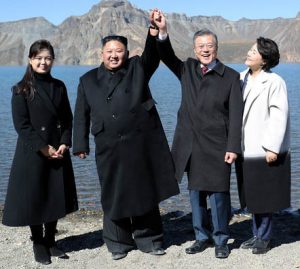Many less North Korean defectors under Kim Jong Un
The number of North Korean defectors to South Korea has fallen since Kim Jong-un came to power seven years ago. Park Byeong-seug, a South Korean lawmaker citing data from the South’s unification ministry, said there had been 1,127 defections last year – compared with 2,706 in 2011.
Mr Park said tighter border controls between North Korea and China and higher rates charged by people smugglers were key factors. China regards the defectors as illegal migrants rather than refugees and often forcibly repatriates them.
Relations between the North and the South – who are still technically at war – have markedly improved in recent months. This came after June’s historic meeting between US President Donald Trump and Kim Jong-un in Singapore, when they agreed in broad terms to work towards the nuclear-free Korean peninsula.
But on Saturday, North Korean Foreign Minister Ri Yong-ho blamed US sanctions for the lack of progress since then. “Without any trust in the US, there will be no confidence in our national security and under such circumstances, there is no way we will unilaterally disarm ourselves first,” Mr Ri said in a speech to the UN General Assembly in New York.
[BBC]

 n the final day of the summit, Moon and Kim took a symbolic step toward peace, traveling outside the capital to visit Mount Paektu – a famous and revered volcano that’s also the highest point on the Korean Peninsula, situated along North Korea’s border with China. The two leaders and their wives posed at the site for photos, standing in front of Heaven Lake — a lake in the caldera of the sacred volcano.
n the final day of the summit, Moon and Kim took a symbolic step toward peace, traveling outside the capital to visit Mount Paektu – a famous and revered volcano that’s also the highest point on the Korean Peninsula, situated along North Korea’s border with China. The two leaders and their wives posed at the site for photos, standing in front of Heaven Lake — a lake in the caldera of the sacred volcano.